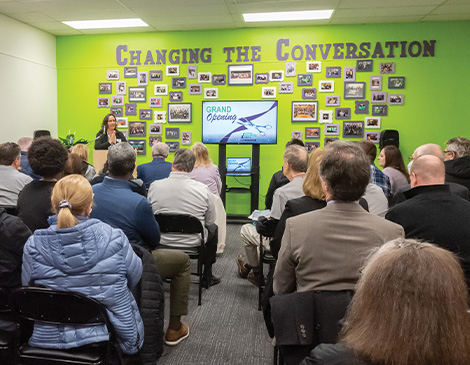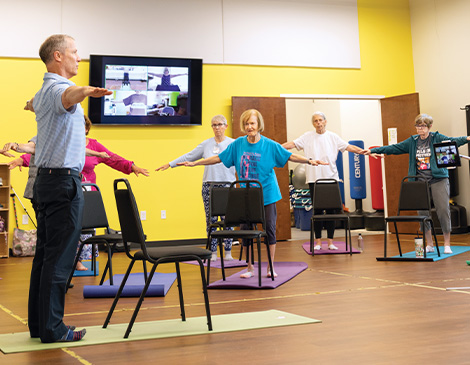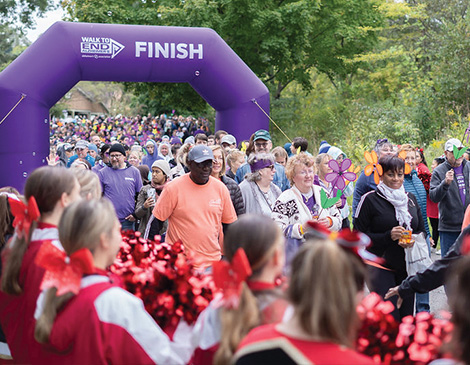Beachwood Nonprofits Empowering Individuals to Manage Health Challenges
Beachwood is a hub of vibrant nonprofit organizations that help people manage a range of conditions, and there is opportunity to work together and multiply the positive impact.
by Kristen Hampshire — Partnership Content | Aug. 31, 2023 | 4:00 PM

Collaboration and caring are a running theme among Beachwood nonprofit organizations that support individuals and families coping with cancer, epilepsy, Alzheimer’s, Parkinson’s disease and all the challenges these conditions present.
Community support is one overwhelming reason these thriving organizations chose Beachwood as a home base. Synergies with local businesses, vibrant health care and accessibility to the people they serve are also benefits.
“There is a lot of opportunity to bring together the research and development that is occurring in the area and connect it with the support services these organizations offer to clients,” says Catherine Bieterman, economic development director for the City of Beachwood.
“It’s incredible the amount of work these organizations do to provide amenities that support clients during their most difficult times in life,” she continues. “They go above and beyond to find ways to bring comfort and joy back into the lives of those they serve while helping them get through their disease.”
Bieterman sees even more possibility. “We can facilitate a web between these organizations and experts they bring to the table to create a network that leads to more innovation. These networks can help transform the care patients receive.”
Here’s a look at how Beachwood’s helping hands are making a difference.
Growing Connections — Empowering Epilepsy

About 10 years ago, Leigh Goldie posted a message on Facebook: “If you know someone who has epilepsy, can you message me?”
She had no idea the response she’d receive after living with the condition most of her life and feeling like there were no resources to help her cope, thrive and manage the challenges. “It was something I learned to hide,” she relates. “You don’t talk about your epilepsy, because you are losing control. I needed someone to help me live well, to help me learn how to talk to my doctor so I could get a more accurate diagnosis and treatment sooner.”
She received 40 messages from friends who said the same thing. She then sent out questionnaires asking questions like, “What is it like living with epilepsy?” “Are your needs being met?” “Do people understand it?”
“They all came back to me saying the same thing I felt,” Goldie says. “When I was living with seizures, I felt isolated and alone.”
She founded Empowering Epilepsy in 2014 out of her home with a goal to connect people with epilepsy to experts and peers for education, care, support, fun and family-friendly events at every age and stage. In March 2022, the organization held a grand opening at its Beachwood location, a 2,700-square-foot space on Mercantile Road that houses conference and meeting rooms, along with an art therapy room.
“We are amazing writers, artists, singers, dancers and musicians — and this allows us to discover our artistic flair and all we can do,” Goldie says.
The headquarters also hosts events, educational sessions and classes focused on improving the mind, body and spirit.
Empowering Epilepsy held a brain surgery conference in June, the 30th anniversary of Goldie’s brain surgery that stopped the seizures. She lived with epilepsy for 14 years, and it wasn’t until 10 years after her diagnosis that she finally found out she could be a surgical candidate. She wants others to know there might be options for them, too. During the last few years, Goldie estimates the organization has helped more than 2,000 people.
The work of Empowering Epilepsy is one of a kind. “We focus on patients,” she says, adding that there are many opportunities in Beachwood to collaborate with other helping nonprofits. “If we start focusing on the commonalities of these diseases, we might find out more answers.”
Feeling Better Every Day — InMotion

Parkinson’s Disease (PD) is a neurological condition with no cure. “Once you are diagnosed, it’s something you live with for the rest of your life, so we want to make sure people have the strength — physical and emotional — to cope with their disease,” says Cathe Schwartz, CEO of InMotion.
InMotion provides a variety of exercise classes designed for people with Parkinson’s. “Exercise is medicine,” she says, relating that evidence-based classes focus on balance, gait and strength. “We also work on the quality-of-life pieces.”
InMotion is unique in the country. “There is nothing else like this,” Schwartz says, adding that the group was founded by five individuals who collaborated and developed the concept. Those were David Riley, MD, Allan Goldberg, Lee Handel, Karen Jaffe, MD and Ben Rossi. “They got together and said, ‘What if we could create a wellness center for people with PD that was free and offered everything they needed to feel stronger and better every day?’”
The organization has grown rapidly, Schwartz reports. In 2019, InMotion purchased a 20,000-square-foot building in Beachwood on Mercantile Road and recently it completed a $3.1 million capital campaign. The facility is accessible to people who have PD who live throughout Northeast Ohio. There, InMotion can offer a wide range of exercise programs, art and music programs, speech and cognition programs, support groups and client assessments.
“It’s a great community, very welcoming and very philanthropic,” Schwartz says of their Beachwood home, pointing to an annual event, the Pals InMotion Race held at Beachwood High School. “The city and school are amazing partners, and it’s an important event because it is responsible for about one-third of our operating budget every year.”
Schwartz encourages those with PD and their families to get to know InMotion. Also, the organization works with other local nonprofits to provide programming. For instance, InMotion and The Gathering Place offered a joint seminar on nutrition they are hoping to repeat this year. “We love collaborating, and it’s a great use of resources when we can all work together,” Schwartz says.
Facing Cancer, Embracing Life — The Gathering Place

“The hospital cured my cancer. The Gathering Place saved my soul.”
A participant shared this with CEO Michele Seyranian — and it perfectly describes the support, understanding, care and programs offered by The Gathering Place. “We are here to help,” she says simply. “They know someone will walk with them and help them, their families and loved ones understand what to do. We take care of people of all ages.”
Seyranian got to know The Gathering Place soon after it started in 1998. Her 4-year-old daughter had been diagnosed with a rare cancer. “We have a medical librarian who helped us find top specialists for pediatric acute myeloid leukemia,” she shares. Seyranian volunteered, helped with strategic planning, served on the board and became CEO when founder Eileen Saffran retired.
The Gathering Place offers support groups, art and music, nutrition programs, education, grief and loss counseling, individual consultations, a wig salon — anything you can imagine related to supporting, educating and empowering those coping with the impact of cancer.
“What’s also important is that all of our services are free of charge,” Seyranian says, acknowledging the “financial toxicity” of cancer.
Ultimately, The Gathering Place is a community.
The organization has expanded with a location in Westlake and virtual programming that serves people across the globe who find The Gathering Place online. It is currently raising money to convert a van into a mobile wig salon. Outreach and accessibility are a focus, with The Gathering Place taking its services into underserved Cleveland communities.
“What makes us unique is that we offer such comprehensive programming for all types of cancer,” Seyranian says.
The Race for The Place, its largest fundraiser, celebrated its 23rd year. With the milestone anniversary, The Gathering Place will be hosting other commemorative events, Seyranian says.
The organization welcomes other nonprofits and groups to share in programming, she adds. “The Alzheimer’s Association is across the street from us, and we do some joint programming,” she points out. “It’s really important that as nonprofits, we help one another succeed.”
Accelerating Research — The Alzheimer’s Association

From dementia care coaching to guiding caregivers, the Alzheimer’s Association of Cleveland chapter provides a breadth of free programs, supports and tools. These resources guide caregivers so they can figure out what’s next and how to help their loved ones.
Ultimately, the association’s mission is to lead the way to end Alzheimer’s and all other dementia — by accelerating global research, driving risk reduction and early detection, and maximizing quality care and support. The organization does this by accelerating global research, promoting risk reduction and early detection, and delivering care and support.
It’s a big charge, especially given the number of individuals coping with the disease. More than 6 million Americans have Alzheimer’s, and by 2050, this number is projected to rise to nearly 13 million. The No. 1 risk factor: growing old. Also, one in three seniors dies with dementia. It is responsible for more mortalities than breast and prostate cancers combined.
“We are the largest nonprofit funder of Alzheimer’s research,” points out Mary Ertle, program director.
As a local chapter of the national organization, Ertle says it offers a 24/7 help line so anyone can ask any question. And the doors are always open. “There was a woman who was diagnosed, and after her appointment, she came right to our office and said, ‘OK. What do I do now?’ It’s amazing to see the way we can help people plan for the future and have a say in what the rest of their lives will be.”
The woman began attending support groups, got involved in the annual Walk to End Alzheimer’s that will take place this year on Oct. 21 and called a staff member to say, “I want you to know you changed my life.”
The longtime Beachwood nonprofit finds synergies in the city, located in Commerce Park. “As nonprofits, we have a lot of the same target population, and if we can do a 30-minute program about Alzheimer’s and combine that with a program about Parkinson’s Disease with InMotion, we are helping even more people,” Ertle says.
Trending
-
1
-
2
-
3
-
4
-
5










